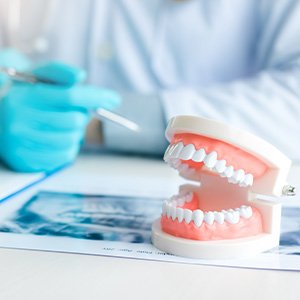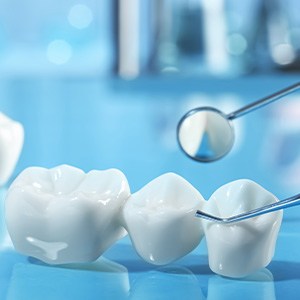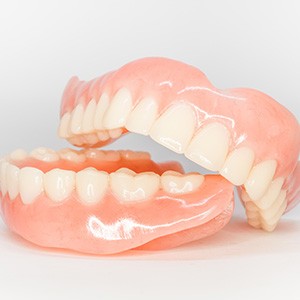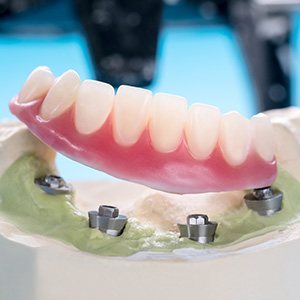Dentures
For Homer Glen Patients
 It’s never easy to face problems relating to missing teeth. Whether your teeth were knocked out, extracted, or have simply fallen out, it’s important to your self-esteem and the function of your mouth to replace them. With today’s technology and continually-improving techniques, people don't have to live with the frustration and embarrassment of missing teeth. Compassionate and skilled dentist Dr. Alan R. DeAngelo can provide implant restorations, fixed bridges, and partial or full dentures for our Homer Glen patients to help them reclaim their smiles. Call DeAngelo Dental of Homer Glen to schedule your appointment and start getting a new and improved smile.
It’s never easy to face problems relating to missing teeth. Whether your teeth were knocked out, extracted, or have simply fallen out, it’s important to your self-esteem and the function of your mouth to replace them. With today’s technology and continually-improving techniques, people don't have to live with the frustration and embarrassment of missing teeth. Compassionate and skilled dentist Dr. Alan R. DeAngelo can provide implant restorations, fixed bridges, and partial or full dentures for our Homer Glen patients to help them reclaim their smiles. Call DeAngelo Dental of Homer Glen to schedule your appointment and start getting a new and improved smile.
What Are Dentures?

Dentures are a restorative solution that allows patients with missing teeth to enjoy a full, complete smile once again. Created with artificial teeth and a natural, gum-colored base, these prosthetics have come a long way from the days of George Washington and his wooden teeth. Fortunately, advancements in dentistry have made it possible for patients to embrace a completely natural look that is affordable, convenient, and long-lasting.
Who's a Good Candidate for Dentures?

Potentially, anyone missing some or all of their adult teeth can benefit from dentures. However, that doesn’t make them the right solution for everyone’s unique circumstances. Before proceeding, you must consult with Dr. DeAngelo to ensure it’s the best treatment. If he finds issues preventing you from restoring your smile immediately, don’t lose hope! Often, other treatments are needed to improve your oral health so you can move forward.
Continue reading to learn more about who dentures can help, and feel free to contact us for additional information.
Effects of Missing Teeth

According to the American College of Prosthodontists, periodontal disease is the leading cause of permanent tooth loss. If plaque forms around your teeth, it can penetrate your gumline and cause an infection. As it progresses, your connective tissues start to recede to escape the illness, leaving your teeth without a strong foundation. Eventually, they become loose and can fall out. Other common issues include progressive tooth decay that weakens your jawbone or physical trauma that knocks a tooth out of its socket.
Whatever the reason for it, gaps in your grin can make it harder to chew food thoroughly or clearly enunciate different words. Also, your jawbone begins to thin without roots in place to stimulate new bone growth every time you bite down, which can change your facial structure.
What Qualifies You for Dentures?

To remain put, dentures must either form a tight suction against the gum tissue over the ridges in your mouth or, for partial sets, clip to healthy teeth. That means you need to have a sufficient jawbone density to support them. If yours is too thin, a bone graft might be necessary to bulk it up.
You might also be a good candidate if you:
- Are committed to oral health.
- Experience tooth sensitivity.
- Have severe tooth decay.
Dr. DeAngelo will examine your mouth at your consultation appointment and recommend an appropriate solution based on his findings. Whether you need full, partial, or implant dentures, he can provide a lifelike prosthetic to rebuild your smile.
Alternative Tooth-Replacement Options

If we find that you’re not a good fit for dentures, there are other options to replace your missing teeth, including:
- Dental bridges. These are best for people who have lost one or several teeth in a row. They’re made of durable ceramic and contain the correct number of pontics (artificial teeth) with a dental crown at both ends. These attach either to healthy abutment teeth or surgically place dental implants on either side of the space in your smile to close the gap.
- Dental implants. These are the only restorations directly embedded into your jaw, giving them added strength and longevity. They tend to cost more upfront but last longer and require fewer repairs.
What is the Difference Between Full and Partial Dentures and the Benefits of Each?

Full and partial dentures are made of prosthetic teeth anchored to a gum-colored base. A partial replaces multiple teeth and fits in with existing teeth, much like a jigsaw puzzle. Full dentures, on the other hand, replace all teeth on the upper or lower jaw.
Usually, partials stay in place with clasps, while full dentures require adhesive cream for security. However, if you would prefer a partial or full denture that will not slip out of place, an overdenture with dental implants may be your best option.
No matter if you choose a full or partial denture, you can expect to see a noticeable difference in the look and feel of your new smile. While these prosthetics are removable and will require that you remain diligent in your oral hygiene routine, they are extremely affordable and allow patients with missing teeth to recapture a more youthful appearance and bite functionality than before. Not to mention, the restorations created today are far more natural in appearance and offer greater support than those created even 20 or 30 years ago!
Implant-Retained Dentures Aftercare

If you choose to have implant-retained dentures (overdentures) put into place, you can expect you will need to follow are a few simple rules to ensure your new restoration is a success. Some of these include:
- Use a small, soft-bristled toothbrush to clean your overdenture. You may even wish to use an electric toothbrush. Not only will you want to clean your denture, but you will also want to make sure you are thoroughly cleaning around your implants.
- When removing your denture to clean your gums and implants, make sure to floss around the visible parts of your implants and just underneath the gum line to ensure food debris and bacteria do not accumulate.
- It is best if you rinse your mouth twice a day with an antimicrobial mouthwash.
- Make sure you’re brushing at least twice a day for two full minutes. It is often better if you brush after every meal.
- Allow them to soak overnight to eliminate any odors and bacteria.
- Keep your regular six-month appointments with Dr. DeAngelo to ensure your mouth remains healthy and your overdenture in optimal condition.
Dentures Aftercare

Caring for your dentures properly is key to keeping them clean, comfortable, and long-lasting. Whether you wear removable dentures or All-on-4 prosthetics, a good aftercare routine will protect your oral health and ensure your restoration looks and feels great.
At DeAngelo Dental of Homer Glen, we’re happy to provide every patient with guidance to help prevent damage, discomfort, and unnecessary wear. Continue reading below to see how a little care each day can keep your dentures in peak condition for years to come.
Removeable Dentures

Remove After Eating
Always remove your dentures after meals to rinse away food particles and prevent staining. Even a quick rinse helps reduce bacteria buildup and keeps your prosthetics looking fresh. We recommend rinsing them gently with lukewarm water each time—never hot. Any source of sufficient heat can warp the base and affect its fit.
Clean Your Restoration
Besides rinsing them after eating, dentures should also be cleaned thoroughly at least once a day. Use a soft-bristled brush and colorless hand soap or denture cleanser to gently scrub every surface. Avoid regular toothpaste, which can be too harsh on the surface. If you need some tips on technique, we’ll happily show you the best way to clean your prosthetics so they stay clean and fresh.
Keep Your Dentures Safe
When not in use, store your dentures in a clean, water-filled container to prevent them from drying out or being taken by curious children or pets. When you clean them, be sure to use a soft towel over the area you’re handling them, as sudden drops can cause cracks or breaks.
Remove When You Sleep
Wearing dentures overnight can cause irritation, bad breath, gum infections, and even raise the likelihood of respiratory illnesses. Removing them before bed gives your gums a chance to rest and breathe and keeps accumulated bacteria from sitting in your mouth for too long. Once you take them out, soak your prosthetics in cool water or a denture-cleaning solution overnight to keep them fresh.
Notice Changes
Pay attention to how your dentures feel each day. If you notice discomfort, shifting, sore spots, or changes in your bite, schedule a visit with our team at DeAngelo Dental of Homer Glen. Catching these issues early helps prevent them from getting worse over time. This not only saves you stress and discomfort, but it also saves you money on more expensive treatments or replacements.
All-on-4 Dentures

All-on-4 dentures are permanently fixed to dental implants, so they don’t come out like removable dentures. This makes daily care a bit different, but just as important. Brush your prosthetic teeth twice a day using a soft-bristled brush and non-abrasive toothpaste. Flossing or using a water flosser around the implant areas can help remove debris and prevent gum inflammation.
At our Homer Glen dental office, we recommend visiting us regularly for checkups to ensure your All-on-4 restoration remains strong and free of tartar or infection. We’ll also show you the best techniques for cleaning around your implants and prosthetics so you can continue keeping your smile secure.
Denture FAQs
What Is the Best Material to Use for Dentures?
It’s important to carefully consider the material your denture will be made of since it will play a large role in determining how long the device lasts and how comfortable it feels. A few popular materials for dentures include porcelain, acrylic resin, and composite resin, but porcelain and acrylic are the two most popular options since they are quite resistant to staining. While they are similar in appearance, porcelain is more durable than acrylic, so it’s significantly easier to care for since bacteria cannot easily flourish on it. However, acrylic is less vulnerable to short-term damage and can adhere more securely to the base of the denture, and it is usually recommended for patients with bone loss.
Do Dentures Break Easily?
While dentures are quite durable, they are not indestructible and can last between five and seven years if they receive excellent care. However, they can be damaged or broken if they are dropped or suffer other accidents while they are being cleaned, inserted, or removed. Your denture may also break if it doesn’t fit properly or has tiny defects like scratches or notches that compromise the structure of the base. Even if you give your dentures the best care possible, they may still wear down due to the stress of repeated use.
What Should I Do if My Dentures Break?
The most serious problem a denture can have is “prosthesis fracture,” meaning that it has broken in half, and this issue is more common in top dentures than bottom ones. The cause and severity of the damage to your appliance will determine whether it can be repaired or must be replaced, so it’s important to contact our office right away when you notice that your device has broken. While we can address minor issues in our office, we may have to send your appliance to a dental lab for a reline in more severe cases. However, your denture will eventually need to be replaced altogether.
Can Dentures Become Ill-Fitting?
Since each denture is customized to fit its patient’s mouth, yours should fit remarkably well when you first receive it. However, dentures do not address the issue of bone loss in the jaw that happens after a tooth is permanently dislodged, so your mouth will continue to change shape over time. This can cause your appliance to not fit well after a few years, and poorly fitting dentures can lead to oral health issues like gum disease, bad breath, and trouble speaking and eating. If your dentures don’t seem to be fitting right anymore, contact our office so we can evaluate the problem and determine an appropriate solution. While we may be able to reline or adjust your dentures so they can fit properly again, it will eventually be necessary to replace the device completely. Some patients find that using denture adhesives between adjustments allows them to wear their appliances more comfortably.
